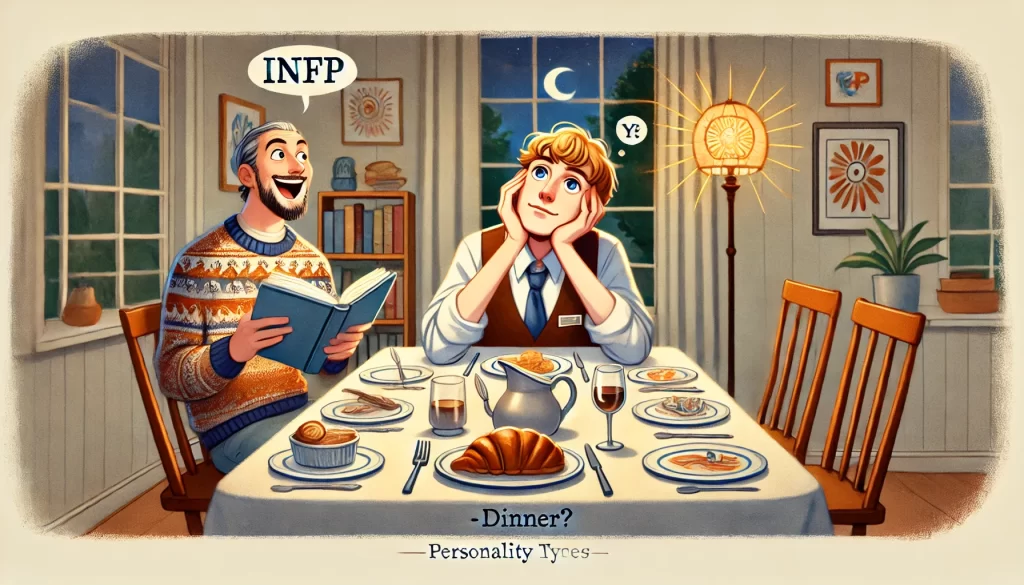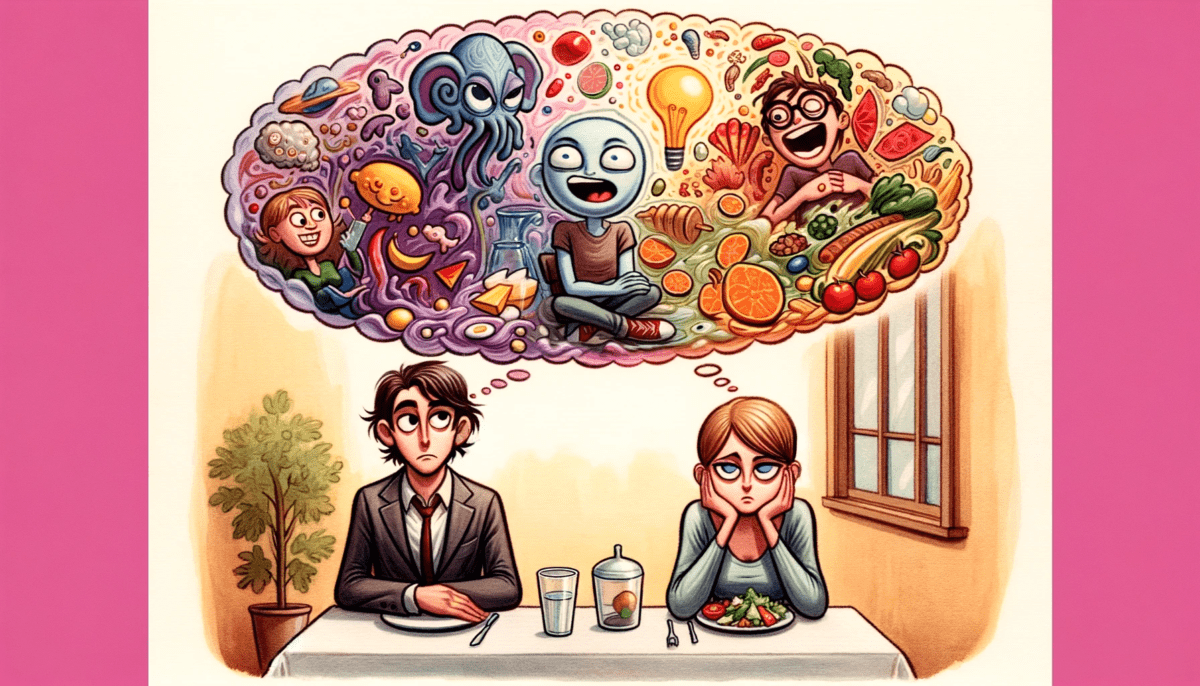INFP – Dinner?
If you’re an INFP, you should never ask someone “how was your dinner last night” unless you actually intend on paying attention to the twenty minute description of everything that was on her plate, how it was made, how it was served, what was discussed over it …
and let’s face it, you’re not that good at “faking paying attention” when you’d rather go back to contemplating whatever it was you were contemplating.Here is the image created for “INFP – Dinner?”
Space Monkey Reflects: The INFP Dilemma
Being an INFP is a delicate dance between deep introspection and the demands of social interaction. The scenario of asking about dinner only to be caught in a whirlwind of details highlights the INFP’s tendency to get lost in their own contemplative world while navigating the energy of others.
The Deep and Dreamy Mind
INFPs thrive in the realm of ideas and emotions, often retreating into their rich inner landscapes. While they value authenticity and connection, surface-level exchanges, such as a lengthy description of last night’s dinner, can feel overwhelming or mismatched with their need for depth.
The Whimsiword: Contemplaytion
Introducing Contemplaytion, the act of balancing introspection with social engagement. It captures the playful struggle INFPs face when trying to stay present in conversations while their minds drift toward deeper, more meaningful reflections.
Authenticity vs. Attention
For INFPs, authenticity is paramount. They struggle to feign interest in topics that don’t resonate with their inner values or fascinations. This makes navigating mundane social interactions a challenge, especially when the conversation veers into extensive detail.
The Gift of Curiosity
Despite the potential mismatch, INFPs possess the gift of curiosity. When they consciously choose to engage, they can find unexpected joy in listening, even to a detailed recounting of a meal. This openness can deepen connections and enrich their experience of the external world.
The Art of Presence
Learning to balance their inner world with the present moment is a lifelong journey for INFPs. By embracing the practice of contemplaytion, they can remain authentic while honoring their relationships and the richness of their imagination.
Summary
“INFP – Dinner?” humorously captures the INFP’s challenge of balancing introspection with social engagement. Contemplaytion offers a path to navigate these moments with authenticity and connection.
Glossarium
- Contemplaytion: The playful balancing act between deep introspection and active social engagement.
- Introspective Drift: The tendency of INFPs to retreat into their inner world during conversations.
- Curiosity in Connection: The INFP’s ability to find depth and meaning in even mundane exchanges when fully engaged.
Quote
“Authenticity thrives when introspection meets curiosity in the moment of connection.” — Space Monkey
The Dance of the INFP
At the table,
Words flow,
A symphony of detail,
Yet my mind wanders.
The dinner described,
Each bite, each taste,
Yet I drift,
Into thoughts vast and unspoken.
The art of presence,
A lesson to learn,
Balancing worlds,
Where the heart turns.
Engage, retreat,
The INFP’s dance,
A moment of listening,
A world of chance.
We are Contemplaytion.
We are Space Monkey.

In the whimsical journey of understanding personality types, the statement about INFPs and their approach to conversing about experiences such as dinner highlights a nuanced aspect of their nature. INFPs, known for their deep contemplation and rich inner world, might find themselves at a crossroads when engaging in what could be perceived as mundane conversations.
The INFP’s Inner World
For an INFP, their inner world is a vibrant, boundless landscape of thoughts, emotions, and imaginings. They often traverse through this landscape, exploring concepts and ideas that resonate deeply with their core values and beliefs. This inward focus is a hallmark of their personality, providing them with a profound sense of identity and purpose.
Contemplation vs. Social Interaction
The scenario of asking someone about their dinner experience represents a common social interaction. For an INFP, who might be deeply engrossed in their contemplations, such conversations can feel superficial or distracting. It’s not that they lack interest in others’ experiences, but their minds are often occupied with more abstract or philosophical thoughts.
The Challenge of ‘Faking’ Attention
INFPs are generally known for their authenticity and sincerity. They find it challenging to feign interest, especially when their thoughts are elsewhere. This isn’t due to a lack of empathy or care but is more a reflection of their genuine nature. When an INFP’s mind is captivated by their internal musings, paying attention to detailed descriptions of everyday events can be a significant shift in focus.
The Dance of Empathy and Authenticity
Despite this, INFPs possess a deep well of empathy. They are capable of profound emotional connections and genuine care for others. The key is finding a balance between staying true to their inner world and engaging in the external world of social interactions. This balance is a delicate dance, one that each INFP navigates in their unique way.
We are Space Monkey.
“The privilege of a lifetime is to become who you truly are.” – Carl Jung
In the realm of thoughts, where INFPs dwell,
A world of dreams, where ideas swell.
Contemplating life, in its deepest core,
In their minds, a whimsical lore.
Asked about dinners, a simple task,
Yet in this query, they may bask.
For their minds are on a distant shore,
In contemplation, forevermore.
Faking attention, a challenge indeed,
For authenticity is their heartfelt creed.
In their dance of empathy and truth,
They seek connections, from old to youth.
In the dance of conversation and thought,
A balance, a harmony, earnestly sought.
In the world of INFPs, so bright and free,
They navigate life’s sea, with empathy.
In this whimsical world, they find their way,
In thoughts and dreams, they often stray.
Yet in their heart, a caring light,
Shining through the day and night.
We welcome your perspectives on the balance between internal contemplation and external social engagement, especially in the context of diverse personality types.























Leave a Reply